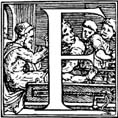
orasmuch as Bryan Green, a sculptor seduced by the word poet and a poet fascinated by the outstanding figure of man, bold against a backdrop of time and space, claims that Vesalius was thrust upon him in a monumental manner, he had to carve these words out of the mental block of history and the lost marbled wane-wax thoughts of the future.
copyright BW Green 2013
if Galen was alive to-day
he’d turn in his grave
all his ideas smashed to pieces
by the Flemish upstart
but no
think again professor
he’d be man enough and more to celebrate with joy
the 500th birthday
how time passes
of his supplanter his usurper
his successor
ever the philosopher he
for it seemed fair to assume that monkey
ape and pig and dog are not different inside to humans
in many cases our behaviour is very similar indeed
and why would the gods have gone to so much trouble
to change things between these creatures and our deer selves
and how was Galen to know
(maybe mice are not the same as men and time will laugh itself silly
at our modern experiments and well made plans)
a lot of blood was let under the bridge to flow and not in vein
quite another stream of thought in fact
to lower the humour of the sanguine tensions
but nobody was laughing
he was a man after the truth
but the truth came after him
a cut above the others
not he the bigot and the closed minded one
‘twas follower admirer and disciple who had that distinction
it took a great man to shake them out of their chairs
and to kick them out of the university doors
a very special man indeed
brave or angry or both
who would open the human body of research to reveal
and to thrust their faces right into
the reality of our being
Vesalius
a man of those fleeting times
who rammed the past like a one man boarding crew
and the great learne’d master of antiquity was left at sea
and right behind poured all the 16th century die-hards
who went down with his ship
years before Vesalius went down with his
which by the by he didn’t apparently
he survived the passage so they think
and died probably of scurvy on this lovely island in Greece
where now they meet in humility and praise to celebrate and to pay homage
1514-1564
hardly time enough to take on the world
hardly time enough to alter the mind and body of mankind
but he did it
a man of muscle and sinew and nerve and guts
bone idle never and with no skeletons in his cupboard
and all the vital organs of state behind him or on his side or fronting for him
he spent his life delving into the amazing body of research that he left behind
for the quick to get clear in their head cells
a corporal discoverer who suffered fools not a corpuscle
went for the jugular and knew exactly where it was and by the way still is
soon word circulated
the heart and soul of an anatomist
with the force of a surgeon screaming for a swab to a dreaming lovelorn nurse
and the arrogance of an over-active thighrod
he pulsed through the world
until medics of every country were shouting
Vesalius Vesalius
he got so they say a little too close to the life of luxury
in the last middle leg of his career
and needed an upholstered rest
not easy to operate on the established past
with no anaesthetic and against its will
and the enemy afoot
with only a blunt idea with which to open old wounds
and to slice through the pampered skin of the unquestioning
and now
hundreds of years later they look to this man
his beautiful books of anatomy still ring the bell
and never before or since was there such a man
we think of him as genius
the brave and bold adventurer
the creator of the modern approach to medicine
they search for his bones to recreate his image
they honour his memory to express their admiration
they treasure his books to learn the better to emulate him
they bow down to his great achievements
Vesalius
master of anatomy
hero of mankind
genius of the inner self
who got under the skin of mankind at a very early age and
brought us to our senses
and everything
but Galen was no fool
and many of his operations are still closely close
to those performed in modern times
especially the eyes
he got the circulation a bit wrong so we’re told
but it was a very long time ago
and things have changed a lot since then
from Galen to Vesalius to……whom
is there somebody out there who is about to reveal something extraordinary
about our bodies
the brain doesn’t exist
for example or
the heart so called is in fact nothing but a pulsating lump of fat
that we inherited for no good reason from fish
our stomachs are in our heads ----that’s why we burp
and we think with our private parts
anything is possible
certainly a lot of people think with their private parts
but it’s more abstract these days
like maybe we are living out a thousand possible lives
in this hologram of a black hole
and Dr. Quantum tells us that things behave differently when observed
so let’s stop looking too closely at each other looking backwards
and jump (with a rope around the waist)
into the artesiance
of Art and Science
which while we're at it
should be a pain between the ears
to amalgamate art and science
what a business
nobody can say what art is
(we know what it was)
and nobody knows where science is going
(we know where it’s been)
and people talk glibly about doing art and science
what on earth could that be
it is a pain between the ears
an incredible challenge
worthy of a lifetime of struggle
we need to create hospitals by the well
to nurse the brave souls who take on this daunting plunge
for there will be casualties
or there should be
if it is done properly
(some might kick the bucket even)
for it is very deep
and dark
and maybe
after years and years
somebody will dip into the cure for everything
imagine how silly we will feel
if it turns out that ill health is totally avoidable
for thousands of years mankind has suffered
and all we needed all along
was a sip of flea’s sperm mixed with humble pie
a little each day
to live healthily forever
let’s drink to the great men of biology and medicine and anatomy
they saved our skin and will do so hopefully until the cows come home
no wish to milk it but anybody over the age of thirty five
and anybody under the age of thirty five
and anybody of exactly the age of thirty five
probably owes their existence to
man’s study of his fellow man
and in particular
Andreas Vesalius
who
by luck or judgement we may never know
chose to study the very fellow human, the very geezer, whose interior set-up
was just right for the books
if Vesalius was alive today
he’d be scrutinizing his corpse in its grave
extracting DNA( Do Not Alter)
and reconstructing the future as the sigh ‘clone’ passes overhead and
heals everybody’s dolly in a brain storm
for between two well established extremes
lies nonsense in all its glory
and the wonderful act of splashing
(this theory floats upon a misunderstanding of the theme of a lecture from a famous Oxford scholar who, as it turned out, is fascinated by the beautiful architectural structures created by this activity)
splashing---put a hand into each pool of thought
(we used to talk of fields of research but that was far too dry
for the tide of new across-the-fence ideas of a fluid nature)
for the grass on the other side is always bogged down in a wetter greenery
put a hand in each pool of thought
now toss the contents high into the limelight
and watch what happens as they mingle
flood and mingle again
and land for the most part outside of the vessel from which they sprang
thus think of art and science as liquid
and you’re half way home
like a liquid lunch solves most of life’s problems
whilst causing others
and the pain between the ears avoided
by a child-like fascination for what happens next in your brain
thawed out thoughts
swirling around the pillars of wisdom
flooding the universities base-meant flaw and
washing away the foundations of
elephantine ivory towers
dripping into sulphuric history to the brim even
rotting the cover ups and downs and going to press the turn-up for the books
and the trousers of the pulled leg and the stone in the sock and the one boned jaw
not
‘preparing the ground for the future’
as we used to put it
but
topping up the puddles of our being and
waving towards our nothingness
our everythingness
our oceanic drop
our watery two-dimensional
grid
Vesalius
1514-1564
